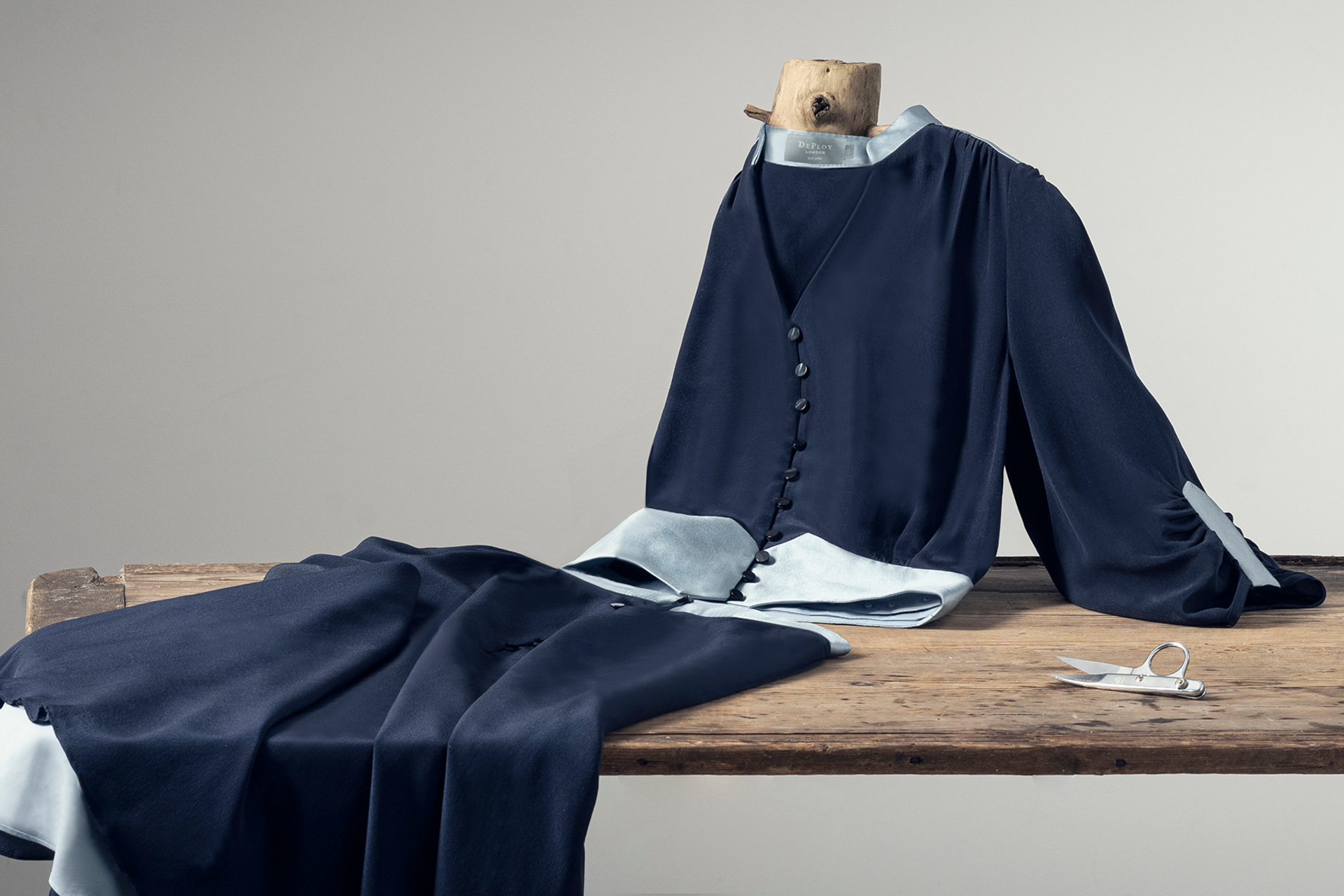B Corp Fashion Brand DEPLOY London is Setting a Responsible Example for the Industry
By
3 years ago
Meet your latest B Corp obsession

As we know, the climate fight is far from over. Businesses all over the world are taking up arms to change the way we consume products, with longevity and zero waste in mind. One of these trailblazing businesses is DEPLOY London, a British brand that proudly champions its B Corp status and offers an example of how the future of fashion could look. We get to know DEPLOY London through its founder, Dr. Bernice Pan, who tells us all about the brand’s sustainability journey.
B Corp Fashion Brand DEPLOY London is Setting a Responsible Example for the Industry
What is DEPLOY London and why was it created?
DEPLOY is a genuine pioneer of circular fashion. We create sustainable style for smart women and a smarter future. Our aim is to make a difference one garment at a time, designing with care to maximise beauty and benefit for people, whilst minimising resource wastage and depletion for the environment.
The idea of DEPLOY was conceived as I was finishing my MA at The Royal College of Art, having witnessed first-hand how exploitative of both natural and human resources the fashion industry was from high-end to high-street. I knew I had to take it seriously, not just by advancing my career and passion, but by finding new solutions to do fashion differently from the commonly accepted ‘industry norm’. This mission drove me to carry out in-depth academic and market research (in the form of a PhD) – a quest to find a way to change both the cultural values and commercial processes of fashioning. The outcome was what gave birth to DEPLOY in 2006, with an innovative 360 Sustainability Ethos as its DNA, and a customised supply chain for the new business model developed at its founding.
The purpose is to pilot a new pathway and prove that a more sustainable and equitable fashion industry-market was not only an attractive possibility, but also a prosperous prospect for all. It’s why the brand is named DEPLOY – a strategic action plan to reform fashion for sustainability and equality. This holistic ethos translates exquisite environmentally-certified materials, expert fine-tailoring craftsmanship and a sincere personal service into each keepsake garment of impeccable fit, lasting appeal and signature versatility, so that we can truly serve to enhance each wearer’s confidence from inside out.
Describe DEPLOY in three words.
Sustainable by design.

Abacus Multiway Suiting Coat-Dress, £598, deployworkshop.com
What made you want your business to become a B Corp?
It had to be seeing the ever-mounting waste and deepening pollution caused by the global fashion industry growth (six to nine per cent per annum, pre-pandemic), resulting in an annual output of 100 billion garments where over 60 per cent became garment-textile waste within a year of being produced and less than two per cent were recycled.
Simultaneously, prolific greenwashing has been sweeping across the globe, often without substantiated information or qualifying action, continuously used to market and sell yet more fashion to propel over-consumption. It not only masks the enormity of the problem but dilutes the seriousness of the sustainability agenda, drowning out the rigorous players in the field and misleading consumers.
These factors have certainly played a role in driving us to further testify our core purpose, differentiate our key principles and communicate our ongoing practice, which is only supported by the B Corp accreditation. Our efforts range from environmental sourcing, reduction in water and energy use and carbon emissions, in-house production here in London, zero-waste supply-chain, fair and respectful partnerships with workers and manufacturers to our bespoke, refurbish, and repair after-sale customer service available always since day one of DEPLOY’s inception 15 years ago, and all the way to our education-charity contributions.
What was your initial score and what is your accreditation score? How long did it take to achieve it?
We achieved a record-breaking 149 in the fashion sector (the qualifying score for certification is 80 points). It took us about eight months to complete the full declaration and assessment processes. Within the last three years we’ve reduced our carbon emission by over 40 per cent. But we have already been operating the majority of the practices in the B Corp assessment criteria for many years. We just took the opportunity of our available capacity during the pandemic to get through our ‘To Do’ list and complete the certification process.
What were the main obstacles to overcome on your journey?
There are many! But entrepreneurship is a continuous journey of trial-and-error. And the challenges evolve as we evolve at different stages of the business. A persistent obstacle when you don’t follow the conventional rulebook and operate totally independently (even if for clear reason and determination), is that it takes more time and effort to come through and shine. It’s almost like we are fine-tuning the design-build of our ship while sailing in a race amongst fierce competition and against the backdrop of rapid cultural and climate change. But at the same time, this is what makes us super agile, resilient and drives us to always think on our feet, as our only option is to overcome each obstacle with creativity and integrity, and turn each obstacle constructively into a new opportunity for growth, learning and upgrade.
What sustainable business practices and initiatives are you most proud of?
Our zero-waste approach extends not just to the way we create our collection, but the way we design our processes and conduct our business. You can call it a work-lifestyle choice I suppose. We always start any decision making with ‘how can we optimise efficiency and sustainability without compromising excellence and quality?’ This can be from how we make use of the smallest scrap of off-cut silk from a previous collection to make delicate covered buttons of a new dress, to how we adapt our display rails, custom-designed for multi-functionality and longevity, from our previous boutique to our new showroom. We believe that all matters and materials are precious, shared resources we all own collectively. So our creativity must be applied to not just propel consumption but to enable conservation.

Glade Wool Tweed Zip Cape, £385, deployworkshop.com
How can we better inform the consumer when greenwashing is prolific?
School Education – We need to be teaching comprehensively what the direct impact our patterns of living, behavior and consumption really are and how they are interconnected to the consequences of climate change, biodiversity losses, toxic and plastic waste, environmental degradation and social inequality. We also need to share knowhow in resolutions and be updated on new solutions tackling these issues. Sustainability should be a mandatory course in the school curriculum like Maths and English.
Media Communication – I think quality, investigative, constructive and accountable journalism plays an increasingly critical role in the public forum and consciousness in our era, where media is filled with manipulated myths and fake news. As once we leave schools and universities, a main source of learning and knowledge base comes from media channels and communication.
Government Legislation – A proper government plays a paramount role in not only guiding citizens towards economic growth but in guarding for balanced, societal well-being. So an impending environmental crisis is not unlike the pandemic or fuel crisis, in terms of how it requires concerted efforts from the government, with strategies, consultations and a framework to better inform the public of preventative measures and long-term approach with transparency and accountability. These kinds of critical, structural shifts of complexity and magnitude involve stakeholders at every level, therefore cannot be left only to businesses and consumers to drive. Like how we became a by-and-large non-smoking country – it was not because tobacco companies decided to reduce their output and raise prices to make more tax contribution for people’s health, it was through extensive research funding, public education on the health risks, harm caused, and stamping out the ‘grey-washing’ of suave coolness in smoking ads, that subsequent legislation was introduced and the seismic change achieved.
What’s next for you and your brand?
The joy and pain of being purpose-driven is that there is an endless ‘To Do’ List. We would really love to do sustainable brand collaborations with the right global-scale partner in order to bring our message and method of positive changemaking out there to a wider audience.
We’re also stepping up our involvement in the circular economy, Green Deal and UN Sustainable Development agenda, and getting more involved in policy, both here in UK and in the EU, where we recently launched the Brussels Sustainable Fashion Forum.
Most importantly we are reigniting our programme of in-person events and pop ups in the UK, US and Asia, and growing to new markets in Europe, and we are looking forward to connecting with you in person and introducing you to the DEPLOY way of sustainable fashioning.
What should we be doing to help the climate change fight?
Remember how you loved that favorite item as a child, so much so that you want to wear it all the time and try to fix when it wore out? Find the things that give you that kind of joy, knowing that it always gives you confidence and reaps you compliments. And that’s how we should be treasuring everything we buy, own and use – to phase out disposable mindsets and habits, and enjoy sustained beauty and the benefits of a lifestyle of values as opposed just consumption. The amount of waste and negative impact we can cut out will make astonishing, accelerating progress for our future.
Final word?
Wear your values.
Get to know more about DEPLOY London via its wesbite deployworkshop.com
Images courtesy of DEPLOY London
DISCOVER MORE
Q&A with Baukjen De Swaan Arons, co-founder of House of Baukjen


















